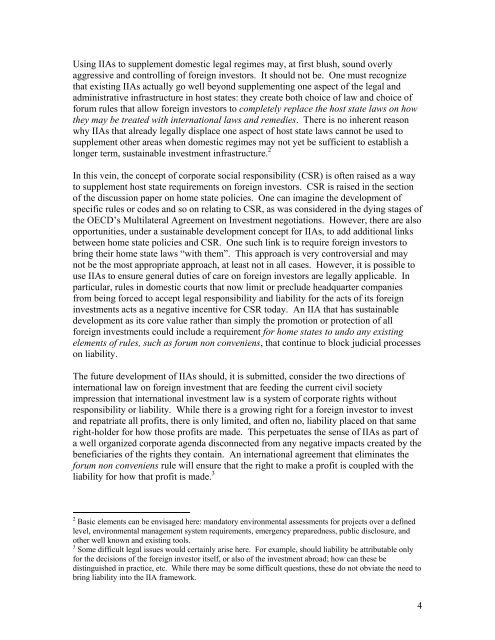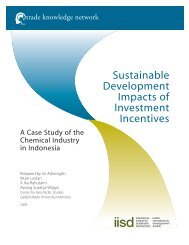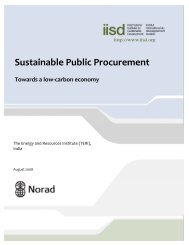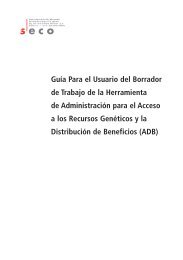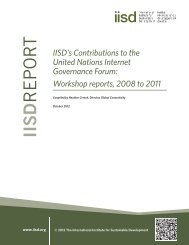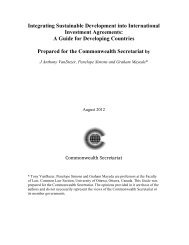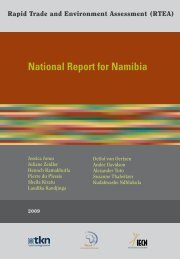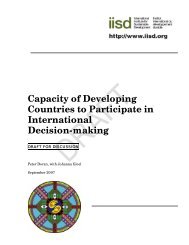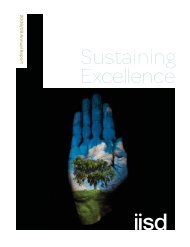The Right of States to Regulate and International Investment Law
The Right of States to Regulate and International Investment Law
The Right of States to Regulate and International Investment Law
You also want an ePaper? Increase the reach of your titles
YUMPU automatically turns print PDFs into web optimized ePapers that Google loves.
Using IIAs <strong>to</strong> supplement domestic legal regimes may, at first blush, sound overly<br />
aggressive <strong>and</strong> controlling <strong>of</strong> foreign inves<strong>to</strong>rs. It should not be. One must recognize<br />
that existing IIAs actually go well beyond supplementing one aspect <strong>of</strong> the legal <strong>and</strong><br />
administrative infrastructure in host states: they create both choice <strong>of</strong> law <strong>and</strong> choice <strong>of</strong><br />
forum rules that allow foreign inves<strong>to</strong>rs <strong>to</strong> completely replace the host state laws on how<br />
they may be treated with international laws <strong>and</strong> remedies. <strong>The</strong>re is no inherent reason<br />
why IIAs that already legally displace one aspect <strong>of</strong> host state laws cannot be used <strong>to</strong><br />
supplement other areas when domestic regimes may not yet be sufficient <strong>to</strong> establish a<br />
longer term, sustainable investment infrastructure. 2<br />
In this vein, the concept <strong>of</strong> corporate social responsibility (CSR) is <strong>of</strong>ten raised as a way<br />
<strong>to</strong> supplement host state requirements on foreign inves<strong>to</strong>rs. CSR is raised in the section<br />
<strong>of</strong> the discussion paper on home state policies. One can imagine the development <strong>of</strong><br />
specific rules or codes <strong>and</strong> so on relating <strong>to</strong> CSR, as was considered in the dying stages <strong>of</strong><br />
the OECD’s Multilateral Agreement on <strong>Investment</strong> negotiations. However, there are also<br />
opportunities, under a sustainable development concept for IIAs, <strong>to</strong> add additional links<br />
between home state policies <strong>and</strong> CSR. One such link is <strong>to</strong> require foreign inves<strong>to</strong>rs <strong>to</strong><br />
bring their home state laws “with them”. This approach is very controversial <strong>and</strong> may<br />
not be the most appropriate approach, at least not in all cases. However, it is possible <strong>to</strong><br />
use IIAs <strong>to</strong> ensure general duties <strong>of</strong> care on foreign inves<strong>to</strong>rs are legally applicable. In<br />
particular, rules in domestic courts that now limit or preclude headquarter companies<br />
from being forced <strong>to</strong> accept legal responsibility <strong>and</strong> liability for the acts <strong>of</strong> its foreign<br />
investments acts as a negative incentive for CSR <strong>to</strong>day. An IIA that has sustainable<br />
development as its core value rather than simply the promotion or protection <strong>of</strong> all<br />
foreign investments could include a requirement for home states <strong>to</strong> undo any existing<br />
elements <strong>of</strong> rules, such as forum non conveniens, that continue <strong>to</strong> block judicial processes<br />
on liability.<br />
<strong>The</strong> future development <strong>of</strong> IIAs should, it is submitted, consider the two directions <strong>of</strong><br />
international law on foreign investment that are feeding the current civil society<br />
impression that international investment law is a system <strong>of</strong> corporate rights without<br />
responsibility or liability. While there is a growing right for a foreign inves<strong>to</strong>r <strong>to</strong> invest<br />
<strong>and</strong> repatriate all pr<strong>of</strong>its, there is only limited, <strong>and</strong> <strong>of</strong>ten no, liability placed on that same<br />
right-holder for how those pr<strong>of</strong>its are made. This perpetuates the sense <strong>of</strong> IIAs as part <strong>of</strong><br />
a well organized corporate agenda disconnected from any negative impacts created by the<br />
beneficiaries <strong>of</strong> the rights they contain. An international agreement that eliminates the<br />
forum non conveniens rule will ensure that the right <strong>to</strong> make a pr<strong>of</strong>it is coupled with the<br />
liability for how that pr<strong>of</strong>it is made. 3<br />
2 Basic elements can be envisaged here: m<strong>and</strong>a<strong>to</strong>ry environmental assessments for projects over a defined<br />
level, environmental management system requirements, emergency preparedness, public disclosure, <strong>and</strong><br />
other well known <strong>and</strong> existing <strong>to</strong>ols.<br />
3 Some difficult legal issues would certainly arise here. For example, should liability be attributable only<br />
for the decisions <strong>of</strong> the foreign inves<strong>to</strong>r itself, or also <strong>of</strong> the investment abroad; how can these be<br />
distinguished in practice, etc. While there may be some difficult questions, these do not obviate the need <strong>to</strong><br />
bring liability in<strong>to</strong> the IIA framework.<br />
4


